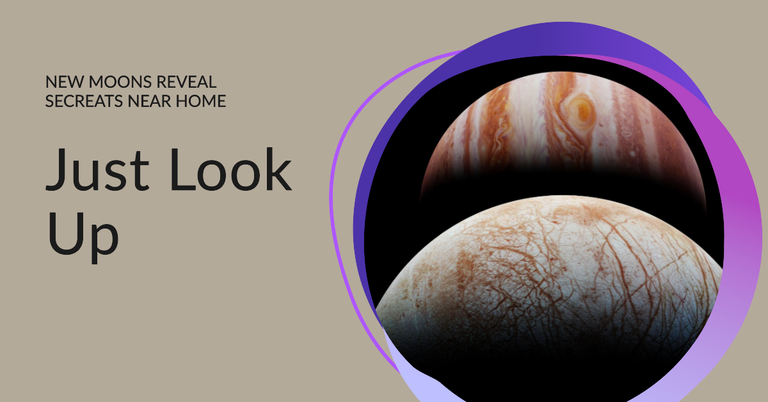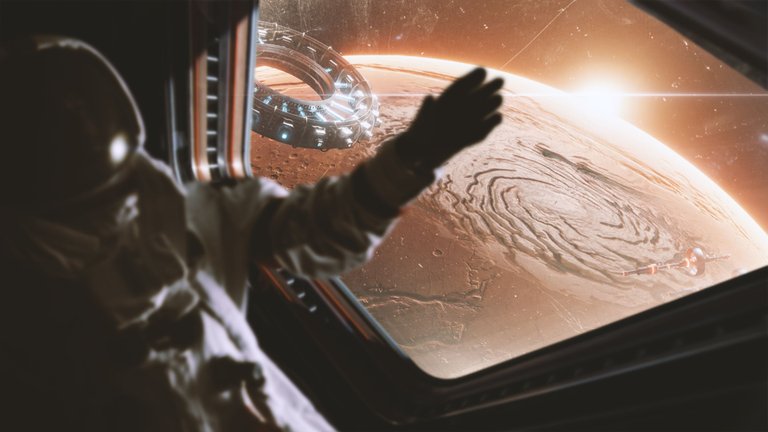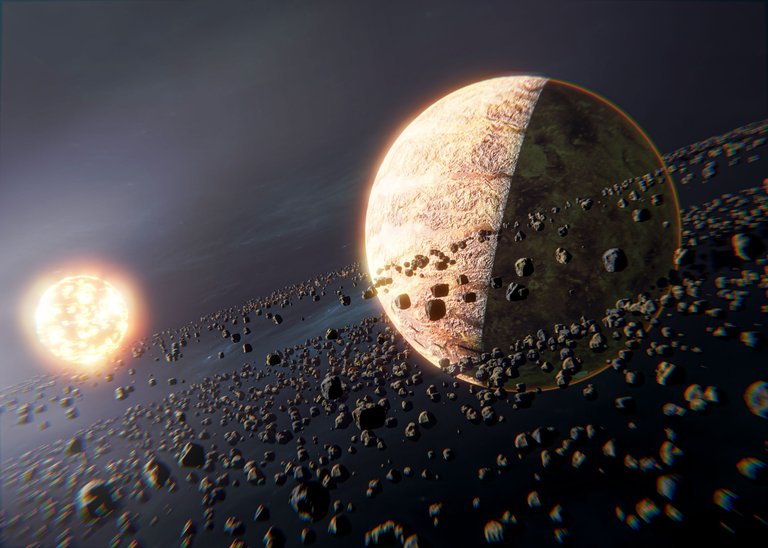Just look up.

Ah, our love to look up and try to find new places. Like the TV show that I used to watch used to say " Space: the final frontier." When I was finishing school, we already had all the 8 planets discovered, well, actually, I still learned a solar system with 9 planets. And one of the messages that I learned from that time is that life was impossible be found in any other planet near us. We have 4 giant gas planets and 3 other rocky planets where for sure, no life form is possible to exist, at least nowadays. So people started to dream about planets outside our solar system, or exoplanets. But a lot has changed since then.

My curiosity brought me again to this topic last year and read that, in addition that exoplanets are being discovered and studied even being far away, we are looking again into our solar system and looking more carefully. Dwarf planets and moons are the new focus for life search. NASA has some ongoing missions to Titan, Enceladus (moons from Saturn) and Europa (moon from Jupiter). The only launched project was the Europa Clipper last year, which will arrive the Jupiter's moon in 2030. The next one to be launched is the Dragonfly space probe to Titan in 2028, while the Enceladus Orbilander is only projected to be launched in 2034. Different places with different characteristics. Europa and Enceladus have a thick layer of ice on top of a liquid water ocean, while Titan has a liquid ocean of methane.
So now we don't care where we are going to find life, it can be a planet or something else. In addition to that the novelties about our solar system don't stop. Recently we found another moon in Uranus. Not long ago, we also identified 128 new moons on Saturn. So More places where we can try to look for life. Not only life that are we looking, but if humanity is thinking of expanding its horizons, we could establish colonies in further places, so space travel towards the end of the solar system could be possible with these bases. Imagine a colony on Pluto? Maybe we can think about visiting an exoplanet from there?
I am excited that, probably in the next couple of years, we will end the mystery about a new planet. The hypothesis of planet IX still bugs me a lot. How can something still be there, but we didn't find it? Many mysteries around the Kuiper belt, the home of Pluto and where we have so many objects that can also bring us intriguing news in the future.

I don't have any study in astrophysics, I am a lay on that topic. But still something that triggers me a lot. The new discoveries that occur once in a while just make me greedy about what is coming next.What you guys think about all of that?


Ah, nossa paixão por olhar para cima e tentar encontrar novos lugares. Como o programa de TV que eu costumava assistir dizia "Espaço: a fronteira final". Quando eu estava terminando a escola, já tínhamos descoberto todos os 8 planetas. Bem, na verdade, eu ainda aprendi sobre um sistema solar com 9 planetas. E uma das mensagens que aprendi daquela época é que era impossível encontrar vida em qualquer outro planeta próximo de nós. Temos 4 planetas gasosos gigantes e 3 outros planetas rochosos onde, com certeza, nenhuma forma de vida é possível de existir, pelo menos hoje em dia. Então, as pessoas começaram a sonhar com planetas fora do nosso sistema solar, ou exoplanetas. Mas muita coisa mudou desde então.

Minha curiosidade me trouxe de volta a este tópico no ano passado e li que, além de exoplanetas estarem sendo descobertos e estudados mesmo distantes, estamos observando novamente o nosso sistema solar e com mais cuidado. Planetas anões e luas são o novo foco da busca por vida. A NASA tem algumas missões em andamento para Titã, Encélado (luas de Saturno) e Europa (lua de Júpiter). O único projeto lançado foi o Europa Clipper no ano passado, que chegará à lua de Júpiter em 2030. A próxima a ser lançada é a sonda espacial Dragonfly para Titã em 2028, enquanto a Encélado Orbilander está prevista para ser lançada apenas em 2034. Lugares diferentes com características diferentes. Europa e Encélado têm uma espessa camada de gelo sobre um oceano de água líquida, enquanto Titã tem um oceano líquido de metano.
Portanto, agora não importa onde vamos encontrar vida, pode ser um planeta ou outra coisa. Além disso, as novidades sobre o nosso sistema solar não param. Recentemente, encontramos outra lua em Urano. Há pouco tempo, também identificamos 128 novas luas em Saturno. Portanto, há mais lugares onde podemos tentar procurar vida. Não apenas a vida que estamos procurando, mas se a humanidade estiver pensando em expandir seus horizontes, poderíamos estabelecer colônias em lugares mais distantes, de modo que viagens espaciais em direção ao fim do sistema solar seriam possíveis com essas bases. Imagine uma colônia em Plutão? Talvez possamos pensar em visitar um exoplaneta de lá?
Estou animado que, provavelmente nos próximos anos, acabaremos com o mistério sobre um novo planeta. A hipótese do planeta IX ainda me incomoda muito. Como algo ainda pode estar lá, mas não o encontramos? Muitos mistérios em torno do cinturão de Kuiper, o lar de Plutão e onde temos tantos objetos que também podem nos trazer notícias intrigantes no futuro.

Não tenho nenhum estudo em astrofísica, sou leigo no assunto. Mas ainda assim é algo que mexe muito comigo. As novas descobertas que acontecem de vez em quando me deixam ansioso para saber o que vem a seguir. O que vocês acham de tudo isso?





Obrigado por promover a comunidade Hive-BR em suas postagens.
Vamos seguir fortalecendo a Hive
[@PowerPaul:]
Hey! Because of your participation in the @CryptoCompany community and your participation in the "Banner for Boost" campaign you received a vote from your CryptoCompany and its trail! Thank you & Hive a great day!
Recent posting from @PowerPaul or the CryptoCompany network:
by @powerpaul
by @cryptocompany
by @powerpaul
I use to be a lover of physics also.
It is a fun topic!
This is all okay, but other than plain curiosity on the part of earthlings and for knowledge about our environments, I've never really seen the persistent need for searching for life on other planets. I know that with Earth's rising population and our technology basically killing it every minute, the idea for a different planet makes sense. I also know that we could find groundbreaking discoveries that would make life easier.
But then, if we do find another planet that can accommodate humans, what next? It'll just be another way for segregation and classism to thrive. It'll now be a question of on-planet or off-planet issues. In the end, it's all just going to be about money. If it helps our medicine, the sick would pay huge bucks to access it. If it helps real estate, everyone would pay huge bucks to benefit. If it helps our minerals, it'll still be limited to just a few people.
Do you think finding a new planet will make humanity any better than it is right now? Because no matter how awesome the planet is, and what it has to offer, humans will end up being the problem of humans. I just feel we have a better chance using all that money to make Earth more habitable for all of us. But then, that's just me. Or what do you think?
Great points you have. I agree in some parts and I think that space conquest is used to demonstrate power. And that consumes resources that could be spent with hunger and health investments. And my curiosity is big and I understand how astrophysicists feel. They chose that path because they breathe that.
But what I want to add is that exploring new worlds and possible new life we can understand better our origins and how life works in general. For example, life in harsh environments can teach us how to generate food crops using other strategies that we don't know yet.
In summary, not sure if that can justify for example, countries that just entered space discovery like India, Iran and even Pakistan. Countries with so many problems to solve internally ... and even the big countries, like the obsession of trump to send a human to Mars still in his mandate
Yeah... I understand. I've heard about how some experiments conducted in space helped scientists to better understand how certain things worked.
But you're also right. Some countries have no business going to space, not when there's violence, hunger, and floods ravaging their land. But then, these guys don't care much about the people they lead. They care only about themselves.
Trump's need to be the first to send a human to space, will only just be a feather to his cap of achievements? But how will that affect the life of the average American?
I like the subject of space a lot...
New starship launch this weekend! Get ready!